Specialty coffee
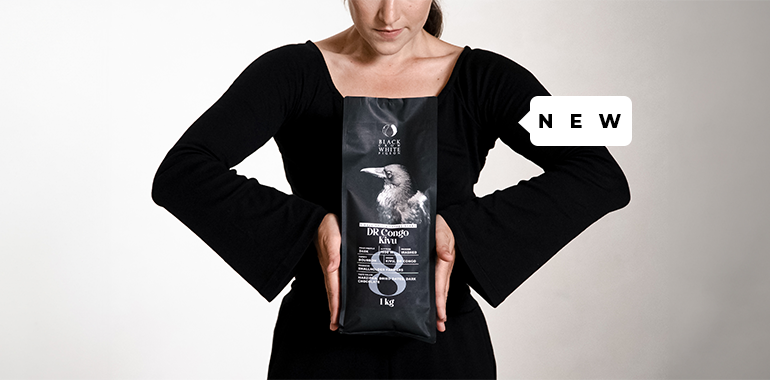
-
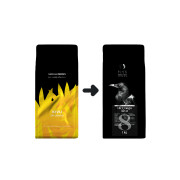
Single-origin coffee beans Black Crow White Pigeon DR Congo Kivu, 1 kg
£31.90Add to basket-
Fast delivery
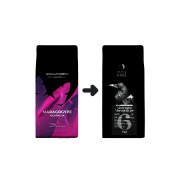
Specialty coffee beans Black Crow White Pigeon Nicaragua Maragogype, 1 kg
£25.83 £36.90 -30%
Add to basket-
Fast delivery
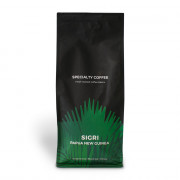
Specialty coffee beans Papua New Guinea Sigri, 1 kg
£37.90Add to basket-
Fast delivery
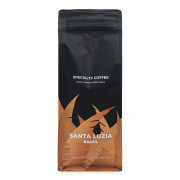
Specialty coffee beans Brazil Santa Luzia, 1 kg
£33.90Add to basket-
Fast delivery
-
New packaging
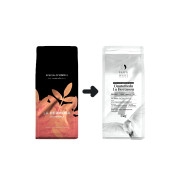
Specialty coffee beans Black Crow White Pigeon Guatemala La Hermosa, 1 kg
£25.13 £35.90 -30%
Add to basket-
Fast delivery
-
New packaging
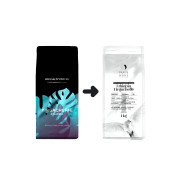
Specialty coffee beans Black Crow White Pigeon Ethiopia Yirgacheffe, 1 kg
£37.90Add to basket-
Fast delivery
-
New packaging
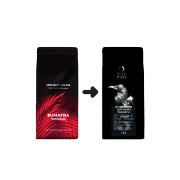
Specialty coffee beans Black Crow White Pigeon Indonesia Sumatra, 1 kg
£38.90Add to basket-
New packaging
-
E-SHOP ONLY
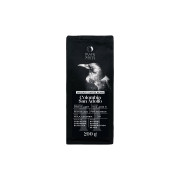
Specialty coffee beans Black Crow White Pigeon Colombia San Adolfo, 200 g
£14.50Add to basket-
Fast delivery
-
New packaging
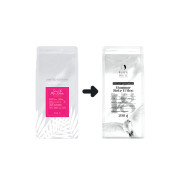
Specialty coffee beans Black Crow White Pigeon Myanmar Shwe Yi Mon, 200 g
£14.00Add to basket-
New packaging
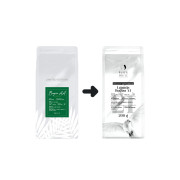
Specialty coffee beans Black Crow White Pigeon Uganda Bugisu AA, 200 g
£12.90Add to basket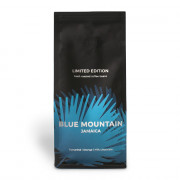
Specialty coffee beans Jamaica Blue Mountain, 250 g
£80.00Add to basket-
New packaging
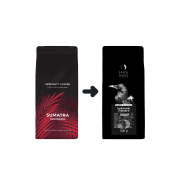
Specialty coffee beans Black Crow White Pigeon Indonesia Sumatra, 250 g
£11.90Add to basket-
Fast delivery
-
New packaging
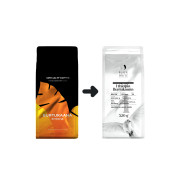
Specialty coffee beans Black Crow White Pigeon Ethiopia Burtukaana, 250 g
£11.13 £15.90 -30%
Add to basket-
Fast delivery
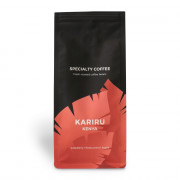
Specialty coffee beans Kenya Kariru, 250 g
£10.43 £14.90 -30%
Add to basket-
Fast delivery
-
New packaging
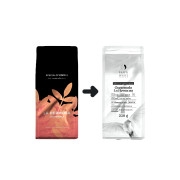
Specialty coffee beans Black Crow White Pigeon Guatemala La Hermosa, 250 g
£10.90Add to basket-
New packaging
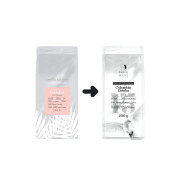
Specialty coffee beans Black Crow White Pigeon Colombia Geisha, 200 g
£28.90Add to basket-
Fast delivery
-
New packaging
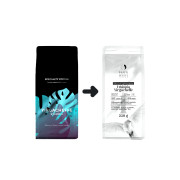
Specialty coffee beans Black Crow White Pigeon Ethiopia Yirgacheffe, 250 g
£11.90Add to basket-
New packaging
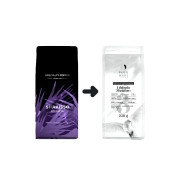
Specialty coffee beans Black Crow White Pigeon Ethiopia Shakisso, 250 g
£14.90Add to basket-
Fast delivery
-
New packaging
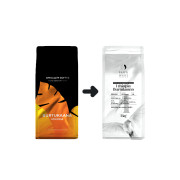
Specialty coffee beans Black Crow White Pigeon Ethiopia Burtukaana, 1 kg
£42.90Add to basket-
Fast delivery
-
New packaging
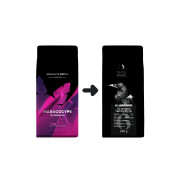
Specialty coffee beans Black Crow White Pigeon Nicaragua Maragogype, 250 g
£15.90Add to basket-
+Gift
-
Fast delivery
-
New packaging
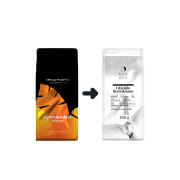
Ground specialty coffee Black Crow White Pigeon Ethiopia Burtukaana, 250 g
£15.90Add to basket-
+Gift
-
New packaging
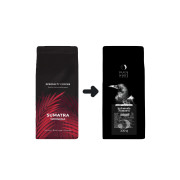
Ground specialty coffee Black Crow White Pigeon Indonesia Sumatra, 250 g
£11.90Add to basket-
E-SHOP ONLY
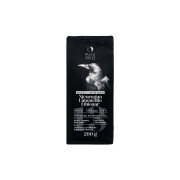
Specialty coffee beans Black Crow White Pigeon Nicaragua Limoncillo Ethiosar, 200 g
£14.90Add to basket-
Fast delivery
-
New packaging
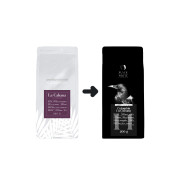
Specialty coffee beans Black Crow White Pigeon Colombia La Cabana, 200 g
£13.90What makes specialty coffee beans exceptional?
Coffee beans that are certified by the American coffee association are called Specialty coffee. This document is granted for those coffee bean producers that ensure high-quality coffee bean growth, crop harvesting, processing, and in the end result in well-balanced flavors and aromas. This type of coffee beans will always have the proper shape, will be dry (not oily), fragrant. This coffee category includes only the coffee that has a score of more than 80 points. For example, “Ethiopia Burtukaana” is evaluated by 88 points, and “Kenya Kariru“ – 87,5. Specialty coffee can also be a limited edition, in special conditions grown, collected, and processed coffee. One of these types of coffee “Kivu” is unique in a way that it is grown only near Kivu lake, in the democratic republic of the Congo. Another coffee that stands out with its extraordinary growing location is called “Blue mountain”. Its coffee bean bushes grow in a mountainous area, that is why their crop harvesting is extremely difficult. Moreover, the “blue” mountain status is only given to the coffee that grows 910 m and higher above sea level. Growing in these conditions, this coffee stands out with its exceptional taste and is highly appreciated by the coffee enthusiasts. Because of its unique way of processing the coffee beans, “Kopi Luwak“ is considered to be one of the most expensive coffee in the world. This coffee cares more about fair and animal abuse free trade certificates, than any other quality validations. Thus, even without the highest evaluation, “Kopi Luwak” is referred to as a specialty, limited edition coffee.
Is this comment useful?Read more Show lessAbout Specialty coffee
If you’re looking for the short answer as to what specialty coffee is and why it’s worth trying, we can certainly give it to you: specialty coffee is, quite simply, the best coffee in the world! There’s a longer, more comprehensive definition out there too, of course: the category of specialty coffee includes varieties that, after being evaluated by certified coffee tasters (also called “Q graders” in English) based on the grading system developed by SCA (Specialty Coffee Association), have received a score of 80 or more (out of the possible 100).
The evaluation itself is performed while adhering to strict requirements (these even include how bright the light in the premises used for tasting must be!), and relies on the traditional cupping method. Freshly roasted beans are ground coarsely, then water is poured over them, and the tasting begins. Numerous different attributes are assessed: aroma, flavour, aftertaste, acidity, body, balance of flavours, sweetness, how “clean” the taste is… Eventually, only the finest, most highly rated varieties are awarded the coveted title of “specialty coffee”. That’s only around 10% of all coffees sold globally!
A Brief History of the Concept of Specialty Coffee
Compared to the long history of coffee in general, the concept of specialty coffee is very young indeed. It first appeared in Tea & Coffee Trade Journal in 1973. Erna Knutsen, a Norwegian coffee expert, used this term to describe single-origin varieties cultivated in unique microclimate conditions and hence marked by unique characteristics. The term really gathered pace in 2000 and has been getting more and more popular ever since. Modern attitudes towards coffee dictate that varieties of the highest quality have nothing to do with a bitter, yet stimulating, brew consumed in a hurry just to get your energy levels up. Good coffee is truly special, incredibly rich and marked by flavours that deserve to be enjoyed slowly, just like you’d enjoy a glass of fine wine. You already know that specialty coffees are nowadays evaluated and graded using a system created by the Specialty Coffee Association—which means that the title of “specialty coffee” is much more than just a clever marketing trick, and should never be confused with varieties touted as being “premium” or “gourmet”.
Specialty vs. Single-Origin Coffee
You’ve probably encountered coffees labelled as “single-origin” on the market too. Single-origin varieties include coffee beans that come from the same geographical location—often even the same coffee estate. Keep in mind though that single-origin coffee is not necessarily “specialty”. If the SCA score isn’t indicated anywhere on the packaging, and the term “specialty” isn’t on there either, such coffee is probably not up to the strict standards we’ve explored earlier.
Specialty Coffees vs. Coffee Blends: Which Are Better and Why?
While there are some specialty coffee blends on the market, these exceptional varieties are usually sold and enjoyed on their own. Their flavours are so distinct and exotic that no further blending is needed. Coffee blends, on the other hand, include at least two coffee varieties. Some blends consist of as many as five or nine! Unlike specialty coffees, blends aren’t that bold. They’re instead characterised by well-balanced, subtle flavours. Specialty varieties are best enjoyed with no additional ingredients, while coffee blends are suited perfectly for various milk-based recipes or drinks with syrups.
From the Coffee Estate All the Way to Your Cup
To be awarded a score of 80 or more, the humble coffee bean must travel a long, winding road, each step of which is paved with care, love and attention:
Place of origin
Similarly to wine, the quality of specialty coffee depends, first and foremost, on where it’s been grown. Different weather conditions and types of soil end up creating different flavour profiles. Just as important are the subspecies the beans belong to, as well as altitude and local microclimate. More often than not, specialty coffee is grown at high altitudes, which slow down the maturing process and endow the beans with added complexity.
Harvesting
Delicious specialty coffee requires juicy, ripe cherries. That’s why, unlike in large coffee plantations where regular coffee is harvested using special machinery, specialty coffee is only ever plucked by hand, with extreme care being taken to preserve every cherry. This way, high quality is ensured (workers take their time to only pick cherries that have fully ripened), while coffee plants are protected from harm that machinery often causes to their branches.
Processing
Once the harvest’s been picked, it’s then processed. This step has a major impact on the resulting brew and includes various methods, the most popular being the natural process, the washed process and the so-called “honey” process.
Sorting
Processed green coffee beans are then carefully sorted and inspected. To go on to the next stage, the potential specialty coffee must have no so-called primary defects, and no more than five secondary defects.
Evaluation
Green coffee buyers then go on to taste the coffee and evaluate it in accordance with the SCA grading system.
Roasting
The roast best suited for the flavour profile of the graded coffee is selected by professional coffee roasters. Once roasted, the coffee is presented to the buyer.
Brewing
Finally, this lengthy chain of actions brings the coffee to the coffee drinkers. They’re no less important than the people we’ve mentioned previously: after all, they’re the ones who go on to actually make and enjoy the drink. To preserve the unique qualities of specialty coffee, it must be brewed properly too, so this step in the journey of your coffee is not that easy of a feat either.
Well, have we managed to peak your interest? We certainly hope we have! Now the next step in your coffee-drinking journey is selecting and purchasing the right specialty beans for you.
How to Find the Right Specialty Coffee for You?
Coffee Friend’s range of specialty coffees includes a wide selection of beans originating from various corners of the globe. They’re grown at various altitudes, processed using different methods and marked by a variety of flavours. To make it easier for you to navigate the world of specialty coffee, let’s explore the meaning behind the information presented on its packaging.
SCA score.
One thing that every specialty coffee has listed on its packaging is, of course, the SCA score. Coffees with a score of 90 to 100 represent the highest quality and boast the most exceptional flavours; a score of 85 to 89.99 indicates excellent specialty coffee; and a score of 80 to 84.99 indicates a specialty variety of a very good quality. Some of these coffees are also part of our Limited Edition range: their supply is extremely low, which makes them that much more special.
Country of origin.
In a way, each specialty variety is so unique and exceptional that it can only stand on its own. However, there are still some common features that may be distinguished based on which region or continent the coffee beans come from. Once you’re familiar with these general characteristics, selecting the right coffee becomes much simpler:
African coffees. If we had to name the Mecca of specialty coffee, it’d undoubtedly be Africa. Coffees from this region are bound to present you with a veritable bouquet of exotic flavours. They’re berryish, fruity, flowery, wine-like, reminiscent of tea, wonderfully juicy… This is the kind of drink that makes you stop for a moment and wonder if coffee can truly taste so unbelievably good.
Asian coffees. The Asian specialty coffee market has been growing rapidly for years now, which is why more and more local coffee farmers focus their attention on specialty varieties. Asian coffees are marked by a larger number of bitter, intense notes. The flavour may remind you of spices, chocolate, tobacco, red wine or wood.
Coffees from South America. If you’re going to try specialty coffee for the first time and don’t feel like exposing your palate to very exotic flavours, go for South American coffee. Its taste is usually well-balanced, naturally sweet, marked by notes of chocolate, nuts and fruit. Compared to African coffees, these ones aren’t as acidic. They’re also more delicate than Asian varieties.
Coffees from Central America. The flavour profile of these coffees tends to be incredibly varied and complex: you can taste anything from tropical fruit to various types of nuts. However, if we had to distinguish a couple of qualities that unite all coffee beans from Central America, it’d be bold flavours and a unique character.
Altitude.
All specialty coffees are grown in the highlands. The higher the altitude, the slower the maturing process and the more complex the resulting taste. High altitudes endow the beans with exceptionally rich flavours, as well as delightful hints of sweetness.
Processing method.
You’ll find the processing method indicated on the packaging or in the online description of every specialty coffee. This should come as no surprise: it has a huge impact on the flavour of the resulting brew. There are various experimental methods out there these days, but the most popular ones are the following three: the natural (or dry) process, the honey (or semi-washed) process, and the washed process. Let’s discuss each of them in more detail:
Natural process
This method is the oldest, as well as the most straightforward. Once harvested, the cherries are dried with the pit (or the future coffee bean) still inside them. They’re then depulped. This endows the brew with a fuller body and a more pronounced hint of sweetness. Beans processed in this manner often boast notes of tropical fruit, chocolate and liquor-filled chocolate candies.
Honey process.
This method is often described as sitting right in the middle between the natural and the washed process. The honey processing method differs from the latter two in that the skin of the cherry is removed, yet a certain amount of pulp is left on the pit. Both the pulp and the pit are then dried. Depending on the amount of pulp covering the pit, this process is further subdivided into three categories. The black honey process involves the majority of the pulp being left on the pit; the red honey process involves a bit less pulp; and the yellow honey technique requires a minimal amount of pulp. Coffees processed in this manner boast a medium body, as well as sweet notes of fruit and tea.
Washed process.
Because of how much water the washed process requires, it’s one of the most expensive processing methods out there. It’s one of the most popular too, however: that’s because this technique is highly unlikely to end up ruining the whole batch. First, cherries are harvested, then special equipment is used to remove the skin and part of the pulp. The pit and pulp are afterwards placed in special containers with a small amount of water in them, and left to ferment. It’s only after 12–72 hours of fermentation that the coffee is washed using lots of water, and then dried. The washed processing method results in particularly “clean” flavours. The body of such coffee is lighter and very delicate, while its taste boasts notes of tea, flowers and citrus fruit.
Anaerobic process.
We’ll throw one more processing method into the mix: it’s the innovative anaerobic process. This technique lets farmers influence the consistency and taste of their coffee with the help of anaerobic fermentation. The process involves future coffee beans (with all or part of the pulp still on them) being placed in a sealed tank with a minimal amount of oxygen inside it. The anaerobic process can endow the brew with exotic, fruity flavours.
Tasting notes.
Most fans of specialty varieties choose coffee based on its tasting notes. It’s important to emphasise here that in the case of specialty coffee, these notes have nothing to do with artificial flavours. On the contrary, they always occur naturally and may remind of various flavours you’re already familiar with: be it berries (strawberries, blueberries, raspberries…), fruit (oranges, pears, lemon, kiwi…), chocolate, wine, or a number of others.
Roast, or recommended brewing methods.
The flavour profile and roast level of some coffees are selected with a certain brewing method in mind. Some varieties are perfect for filter coffee, others result in the ideal espresso, while still others are more versatile and roasted in a way that makes them suited for a variety of brewing techniques. Make sure to pay attention to this information when reading through the description of the specialty coffee you’re eyeing.
How Should You Brew Specialty Coffee?
Some people say that specialty coffees should only ever be brewed using trendy brewing tools like Chemex coffee makers, French presses or coffee drippers. Such sworn fans believe that tools like these are the only ones capable of unveiling the full palette of flavours hiding in specialty coffee beans. We beg to differ though. Specialty coffee can be brewed in any way you like! Feel free to use filter coffee machines, espresso machines or even bean-to-cup coffee machines if you want. However, if your coffee machine doesn’t grind coffee on its own, make sure to purchase a separate grinder for your specialty coffee rituals.
To Conclude…
As you can probably see, specialty coffee is much more than just a high SCA score: behind this number, there’s tireless dedication, care, attention and genuine passion of hundreds of different people. When you buy specialty coffee, you know you’ve selected the very best the world of coffee has to offer. Now go ahead and dive into the joy of new discoveries, unexpected flavours and coffees loved and appreciated by true connoisseurs!
Read moreWe have updated our cookie policyOptionsCookies! They are always useful, but we cannot use them without your consent.You can select which cookies you agree to use. Some of them are essential and cannot be turned off.

